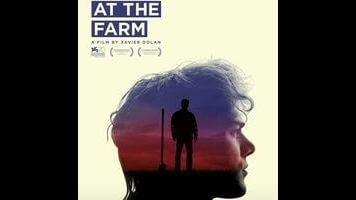Xavier Dolan struggles to move Tom At The Farm from stage to screen

Four out of the five movies written and directed by Xavier Dolan have been complete originals: noisy, brash, seriocomic relationship studies, born from the hyperactive brain of this prodigiously talented Québécois filmmaker. Tom At The Farm, which Dolan made before his recent Cannes prizewinner, Mommy, is the exception—an adaptation of a play by Michel Marc Bouchard (Lilies), who helped write the screenplay. Accordingly, it’s something of a departure for the 26-year-old festival darling; out of reverence for his text, Dolan has pulled back on the manic energy that characterizes his other features, emerging with something more measured and deliberate, a psychosexual chamber piece. But as interesting as it is to see the filmmaker move out of his wheelhouse, Tom At The Farm is neither dramatically satisfying nor psychologically convincing. Something was clearly lost in its transition from stage to screen.
The fish-out-of-water setup is promising. Directing himself for the first time since 2010’s Heartbeats, Dolan stars as the eponymous city slicker, driving from Montreal to the remote rural hometown of his deceased boyfriend, Guillaume, who recently died in an unspecified accident. The first shot of the film is Tom scrawling some tender parting words in blue ink, his open car door beeping incessantly, like an erratic pulse. The eulogy will not be read at the funeral. Guillaume’s mother (Lise Roy, who played the part onstage) has never heard of Tom. What’s more, she has no idea that her son was gay, and has in fact been persuaded that he was dating a woman. How can Tom give a proper goodbye when doing so would posthumously out his lover? Is it better for this woman to know who her boy really was or would that knowledge just compound her grief?
Just as Tom At The Farm seems poised to dig into these tough questions, the film takes a sharp left turn into more outlandish territory with the introduction of Guillaume’s brutish older brother, Francis (Pierre-Yves Cardinal, also reprising his role from the play). Violently intent on preserving his mother’s ignorance, Francis bullies and threatens Tom into silence. But he’s not just your garden-variety homophobe, the mere “redneck” that his uneasy houseguest labels him. There’s a predatory sexual charge to his physical abuse, especially once this possible closet case essentially takes Tom hostage, forcing him not just to stay planted in their drafty farmhouse, but also to milk the cows, snort cocaine, and dance with him. Tom’s actions take a turn for the perplexing, too: Out of grief or guilt or some form of Stockholm syndrome, he sticks around, blowing off every opportunity to escape, and gradually taking a warped pride in his contributions to the family business.
Bouchard wrote Tom At The Farm as a study of the double lives some gay men are still forced to live, even in this day and age. (“Homosexuals learn to lie before they learn to love,” the Canadian playwright declares in his preface.) But Dolan, a gay artist whose own work has dealt both casually (Heartbeats) and centrally (Laurence Anyways) with sexual and identity politics, mainly treats the material as a Hitchcockian exercise. In place of his usual collection of pop-music needle drops, the director employs a string-heavy suspense score by Gabriel Yared, teasing the approach of danger. Ominous helicopter shots emphasize the vast, foreboding isolation of the farmland, as though Tom were the unwitting star of a Canadian Texas Chainsaw remake. Moments of horror-movie dread—like our hero sprinting through a cornfield, razor-sharp stalks slowing his flight—puncture the pregnant tension of the indoor scenes. Compared to Dolan’s other efforts, it’s downright austere, but the director’s ostentatious style still threatens to upstage the performances, his own included.
Ultimately, this could just be a case of an unadaptable play. Bouchard’s most experimental touch was having Tom speak every inner thought aloud in conversation—a gimmick that boldly emphasized the discrepancy between who he is and who he’s forced to pretend to be in mixed company. Dolan ditches that device, which is understandable but also detrimental, as doing so denies us the insight into Tom’s sometimes baffling decisions. Furthermore, the filmmaker’s attempts to “open up” the play with field trips to a doctor’s office, gas station, and dive bar don’t just rob the material of its essential claustrophobia, they increase the absurdity of Tom’s refusal to extricate himself from a sticky situation. (Only on stage, perhaps, could one accept a version of this story that doesn’t end, very early on, with the young man getting the hell out of dodge upon first opportunity.) It’s possible to enjoy Tom At The Farm as a grotesquely exaggerated vision of unwilling, then willful repression. Just don’t look to it for recognizably human behavior.